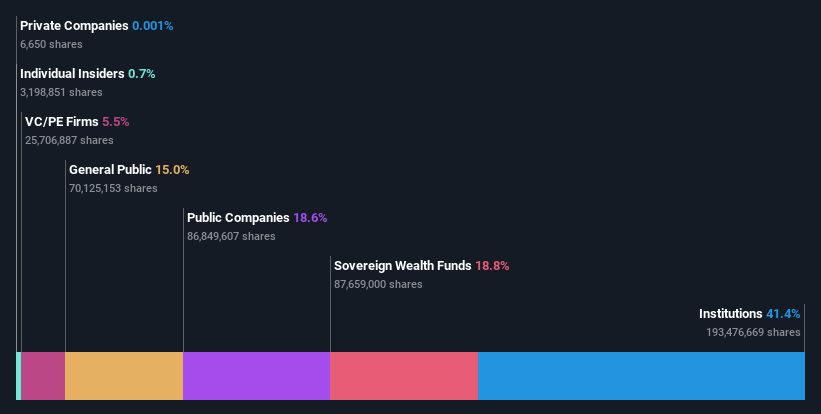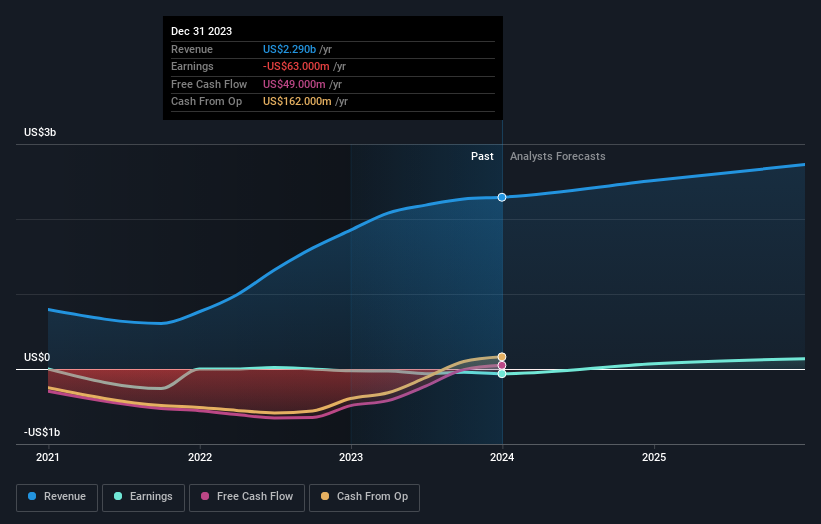Institutional investors may adopt severe steps after Global Business Travel Group, Inc.'s (NYSE:GBTG) latest 6.2% drop adds to a year losses
Key Insights
Institutions' substantial holdings in Global Business Travel Group implies that they have significant influence over the company's share price
53% of the business is held by the top 2 shareholders
Using data from analyst forecasts alongside ownership research, one can better assess the future performance of a company
A look at the shareholders of Global Business Travel Group, Inc. (NYSE:GBTG) can tell us which group is most powerful. And the group that holds the biggest piece of the pie are institutions with 41% ownership. That is, the group stands to benefit the most if the stock rises (or lose the most if there is a downturn).
And institutional investors saw their holdings value drop by 6.2% last week. This set of investors may especially be concerned about the current loss, which adds to a one-year loss of 21% for shareholders. Institutions or "liquidity providers" control large sums of money and therefore, these types of investors usually have a lot of influence over stock price movements. As a result, if the downtrend continues, institutions may face pressures to sell Global Business Travel Group, which might have negative implications on individual investors.
Let's take a closer look to see what the different types of shareholders can tell us about Global Business Travel Group.
View our latest analysis for Global Business Travel Group
What Does The Institutional Ownership Tell Us About Global Business Travel Group?
Institutional investors commonly compare their own returns to the returns of a commonly followed index. So they generally do consider buying larger companies that are included in the relevant benchmark index.
We can see that Global Business Travel Group does have institutional investors; and they hold a good portion of the company's stock. This suggests some credibility amongst professional investors. But we can't rely on that fact alone since institutions make bad investments sometimes, just like everyone does. When multiple institutions own a stock, there's always a risk that they are in a 'crowded trade'. When such a trade goes wrong, multiple parties may compete to sell stock fast. This risk is higher in a company without a history of growth. You can see Global Business Travel Group's historic earnings and revenue below, but keep in mind there's always more to the story.
Hedge funds don't have many shares in Global Business Travel Group. American Express Company, Asset Management Arm is currently the largest shareholder, with 34% of shares outstanding. Meanwhile, the second and third largest shareholders, hold 19% and 16%, of the shares outstanding, respectively.
After doing some more digging, we found that the top 2 shareholders collectively control more than half of the company's shares, implying that they have considerable power to influence the company's decisions.
While studying institutional ownership for a company can add value to your research, it is also a good practice to research analyst recommendations to get a deeper understand of a stock's expected performance. There are a reasonable number of analysts covering the stock, so it might be useful to find out their aggregate view on the future.
Insider Ownership Of Global Business Travel Group
While the precise definition of an insider can be subjective, almost everyone considers board members to be insiders. Company management run the business, but the CEO will answer to the board, even if he or she is a member of it.
Most consider insider ownership a positive because it can indicate the board is well aligned with other shareholders. However, on some occasions too much power is concentrated within this group.
Our information suggests that Global Business Travel Group, Inc. insiders own under 1% of the company. Keep in mind that it's a big company, and the insiders own US$18m worth of shares. The absolute value might be more important than the proportional share. It is always good to see at least some insider ownership, but it might be worth checking if those insiders have been selling.
General Public Ownership
With a 15% ownership, the general public, mostly comprising of individual investors, have some degree of sway over Global Business Travel Group. This size of ownership, while considerable, may not be enough to change company policy if the decision is not in sync with other large shareholders.
Private Equity Ownership
With a stake of 5.5%, private equity firms could influence the Global Business Travel Group board. Sometimes we see private equity stick around for the long term, but generally speaking they have a shorter investment horizon and -- as the name suggests -- don't invest in public companies much. After some time they may look to sell and redeploy capital elsewhere.
Public Company Ownership
We can see that public companies hold 19% of the Global Business Travel Group shares on issue. We can't be certain but it is quite possible this is a strategic stake. The businesses may be similar, or work together.
Next Steps:
While it is well worth considering the different groups that own a company, there are other factors that are even more important.
Many find it useful to take an in depth look at how a company has performed in the past. You can access this detailed graph of past earnings, revenue and cash flow.
But ultimately it is the future, not the past, that will determine how well the owners of this business will do. Therefore we think it advisable to take a look at this free report showing whether analysts are predicting a brighter future.
NB: Figures in this article are calculated using data from the last twelve months, which refer to the 12-month period ending on the last date of the month the financial statement is dated. This may not be consistent with full year annual report figures.
Have feedback on this article? Concerned about the content? Get in touch with us directly. Alternatively, email editorial-team (at) simplywallst.com.
This article by Simply Wall St is general in nature. We provide commentary based on historical data and analyst forecasts only using an unbiased methodology and our articles are not intended to be financial advice. It does not constitute a recommendation to buy or sell any stock, and does not take account of your objectives, or your financial situation. We aim to bring you long-term focused analysis driven by fundamental data. Note that our analysis may not factor in the latest price-sensitive company announcements or qualitative material. Simply Wall St has no position in any stocks mentioned.


